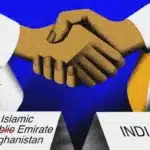In the heart of South Asia and the Middle East, Pakistan finds itself at the epicenter of a high-stakes geopolitical chessboard, where recent events and emerging dynamics have ignited a complex and gripping narrative that could redefine the region’s future.
Iran’s assertion of thwarting a Mossad drone attack in collaboration with Afghanistan’s General Directorate of Intelligence (GDI) highlights the persistent security challenges in the region and the potential intelligence and security collaboration between Iran and Afghan intelligence. Simultaneously, Iran’s engagement with the Taliban-led Afghan government, illustrated by Mullah Baradar’s visit, underscores Afghanistan’s strategic interests in strengthening its ties with Iran. This comes at a time when Afghanistan is facing an influx of Afghans returning to their homeland as a result of the repatriation process initiated by both Pakistan and Iran. However, it’s worth noting that Afghanistan’s interim government criticizes only Pakistan’s repatriation plan for Afghan immigrants, which leaves out Iran, even though hundreds of illegal Afghans have been repatriated and shot since the takeover of Kabul by the Islamic Emirate of Afghanistan (IEA) at the Afghan-Iran border.
While Afghanistan is looking for alternative trade routes to limit its dependence on Pakistan, Iran stands as one potential option that requires further exploration.
This is vital to consider the viability of the supply chain for traders from the upper Afghan regions to Chabahar, in comparison to what is available from Pakistan. Moreover, recent data also reveals trade imbalances between Afghanistan and Iran, emphasizing the need for improved border facilities and streamlined financial mechanisms. Notably, Pakistan remains Afghanistan’s primary trading partner, with bilateral trade reaching $135.30 million in August 2023.
The mention of the Wakhan Corridor during the meeting adds depth to this narrative, as it holds the potential to influence regional trade routes and connectivity. Furthermore, despite challenges and delays, India’s growing interests in Afghanistan and Iran, driven by the 2012 Connect Central Asia Policy, introduce an additional layer to the regional tableau. As India strengthens its ties with Iran and deepens its involvement in Afghanistan, the geopolitical landscape becomes more complex, raising questions about Pakistan’s strategy in managing relations with both its neighbors and India.
India’s regional objectives, complicated by the resurgence of the Taliban and United States sanctions on Iran, further complicate the regional scenario. The China-Iran economic and security partnership, with potential Chinese investments of up to $400 billion, alters the regional dynamics significantly. While viewed by some as a rebuke to U.S. efforts to isolate Iran, it also prompts questions about India’s evolving role and influence in the region.
In this intricate geopolitical landscape, Pakistan stands at a critical juncture, and its choices will have profound consequences.
The race for influence over the Wakhan Corridor, combined with trade imbalances and evolving international partnerships, significantly impacts Pakistan’s strategic positioning. As the region undergoes transformation, Pakistan’s ability to adeptly balance its relationships and navigate emerging challenges will be pivotal in determining its role and influence in South Asia and the Middle East.
Despite the complexities and challenges in the region, there remains a compelling question: why can’t Afghanistan and Pakistan collaborate in dealing with threats like ISKP and TTP, which have been resurging? Both countries share a common interest in combating these extremist groups that threaten regional stability. Collaboration between Afghanistan and Pakistan in intelligence sharing, border control, and joint military efforts could prove highly effective in addressing these security threats and fostering greater regional stability. However, historical tensions and mistrust between the two nations have hindered such cooperation in the past. Overcoming these obstacles and forging a collaborative approach could be a significant step toward regional security and stability.
Your go-to editorial hub for policy perspectives and informed analysis on pressing regional and global issues.





Add a Comment